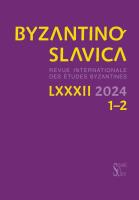Die Übersetzung einiger soziokultureller Begriffe im Lehrevangelium Konstantins von Preslav
The Translation of Some Sociocultural Terms in the Teaching Gospel of Constantine of Preslav
Author(s): Lora TasevaSubject(s): Middle Ages, Historical Linguistics, Comparative Linguistics, Biblical studies, Philology, Translation Studies
Published by: AV ČR - Akademie věd České republiky - Slovanský ústav and Euroslavica
Keywords: Constantine of Preslav; Didactic Gospel; Old Church Slavonic Translation; Byzantine Linguistic Influence; Medieval Translation; 9th Century;
Summary/Abstract: The article studies the ninth-century collection of orations called Uchitel’noe evangelie [Didactic Gospel] that contains both translated and original pieces by Constantine of Preslav. The medieval translator faced an extremely difficult linguistic and cultural task since, on the one hand, he had to render clearly and exactly the Byzantine text and make it understandable to his audience of neophyte Christians. On the other hand, however, he also needed to preserve the richness of the Byzantine source text which was composed in a language with a millennial tradition (Greek) and transmit it to a target text by means of a language whose written history was only about three decades old (Old Church Slavonic). The study focuses on the translation techniques in relation to several sociocultural concepts related to the Hellenistic world: πολιτεία, ἀριστοκρατέομαι, ὀλιγαρχέομαι, ψῆφος, and ψηφίζομαι. Several strategies in their transmission stand out: a) free (contextual) translation (ψηφίζομαι > вѣщати); b) more general semantic correspondences (ἀριστοκρατέομαι > власти); c) lexical differentiation of the semantic nuances of the same word (πολιτεία > житиѥ and жиꙁнь; d) addition of new meanings to existing words (житиѥ ‘way of life in a socium prescribed by certain rules and norms’, жиꙁнь ‘state system’, иꙁдречениѥ ‘decision, judgement’); e) loan translation (ὀλιγαρχέομαι > оумалѣѥмъ бꙑти). In most cases, the Slavic correlate reflects well the semantics of the Greek lexeme in the specific context. The decisions of the Old Bulgarian man of letters are examined in comparison with dozens of other translations from the ninth to the fourteenth centuries. It is found that, due to their contextual nature, most of these correlates remained isolated only in the Didactic Gospel. However, through them, Constantine of Preslav also enriched the Greek-Old Church Slavonic paradigm in the area of lexis.
Journal: Byzantinoslavica - Revue internationale des Etudes Byzantines
- Issue Year: LXXXII/2024
- Issue No: 1-2
- Page Range: 129-149
- Page Count: 21
- Language: German
- Content File-PDF

